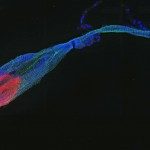Lien vers Pubmed [PMID] – 12626600
J. Immunol. 2003 Mar;170(6):3392-400
In normal mice, stromal cell-derived factor 1 (SDF-1/CXCL12) promotes the migration, proliferation, and survival of peritoneal B1a (PerB1a) lymphocytes. Because these cells express a self-reactive repertoire and are expanded in New Zealand Black/New Zealand White (NZB/W) mice, we tested their response to SDF-1 in such mice. PerB1a lymphocytes from NZB/W mice were exceedingly sensitive to SDF-1. This greater sensitivity was due to the NZB genetic background, it was not observed for other B lymphocyte subpopulations, and it was modulated by IL-10. SDF-1 was produced constitutively in the peritoneal cavity and in the spleen. It was also produced by podocytes in the glomeruli of NZB/W mice with nephritis. The administration of antagonists of either SDF-1 or IL-10 early in life prevented the development of autoantibodies, nephritis, and death in NZB/W mice. Initiation of anti-SDF-1 mAb treatment later in life, in mice with established nephritis, inhibited autoantibody production, abolished proteinuria and Ig deposition, and reversed morphological changes in the kidneys. This treatment also counteracted B1a lymphocyte expansion and T lymphocyte activation. Therefore, PerB1a lymphocytes are abnormally sensitive to the combined action of SDF-1 and IL-10 in NZB/W mice, and SDF-1 is key in the development of autoimmunity in this murine model of lupus.

